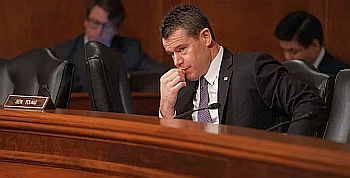 U.S. Senator Todd Young Tuesday applauded the Senate passage of the final National Defense Authorization Act (NDAA) for Fiscal Year 2020. Senator Young, a U.S. Naval Academy graduate who served in the Marine Corps and now serves on the Senate Foreign Relations Committee, worked to successfully include provisions in the annual military funding bill that support Indiana and national security priorities. The Senate voted 86-8 to approve the legislation and send it to the President for signature.
U.S. Senator Todd Young Tuesday applauded the Senate passage of the final National Defense Authorization Act (NDAA) for Fiscal Year 2020. Senator Young, a U.S. Naval Academy graduate who served in the Marine Corps and now serves on the Senate Foreign Relations Committee, worked to successfully include provisions in the annual military funding bill that support Indiana and national security priorities. The Senate voted 86-8 to approve the legislation and send it to the President for signature.
“The legislation we passed today includes provisions that are vital to our state and our national security. To keep Hoosier families safe, we must continue to modernize our military with advanced capabilities, invest in next generation jets, increase the Navy’s fleet size, and most importantly, provide for those in uniform. I am proud that this year’s NDAA will help us accomplish these goals,” said Senator Young. “I was especially pleased that I was able to secure language bolstering the research and development of hypersonic technology and call attention to the significant work happening on these efforts around the state of Indiana. In an era of great power competition, investing in next generation technologies like hypersonics will help guarantee our warfighters have unparalleled capabilities to deter or respond to global threats in the years ahead.”
The NDAA is critical to our national security as it authorizes critical funding for our service members and establishes the policies for the Department of Defense. This year’s NDAA provides a significant pay raise for our troops, overhauls military housing, reassures our allies of America’s strength and power abroad, and supports job creation and stability in Indiana’s defense workforce.
Senator Young specifically fought for language included in the NDAA that directs the Department of Defense to establish a Joint Hypersonics Transition Office to coordinate and streamline technical priorities across the Department and align the Office with universities like Notre Dame, Purdue, and Indiana University focused on hypersonic research and development. This will expedite the transition of hypersonic technologies from the lab to the battlefield, and help us outpace adversaries like China who are working to develop similar technologies.














